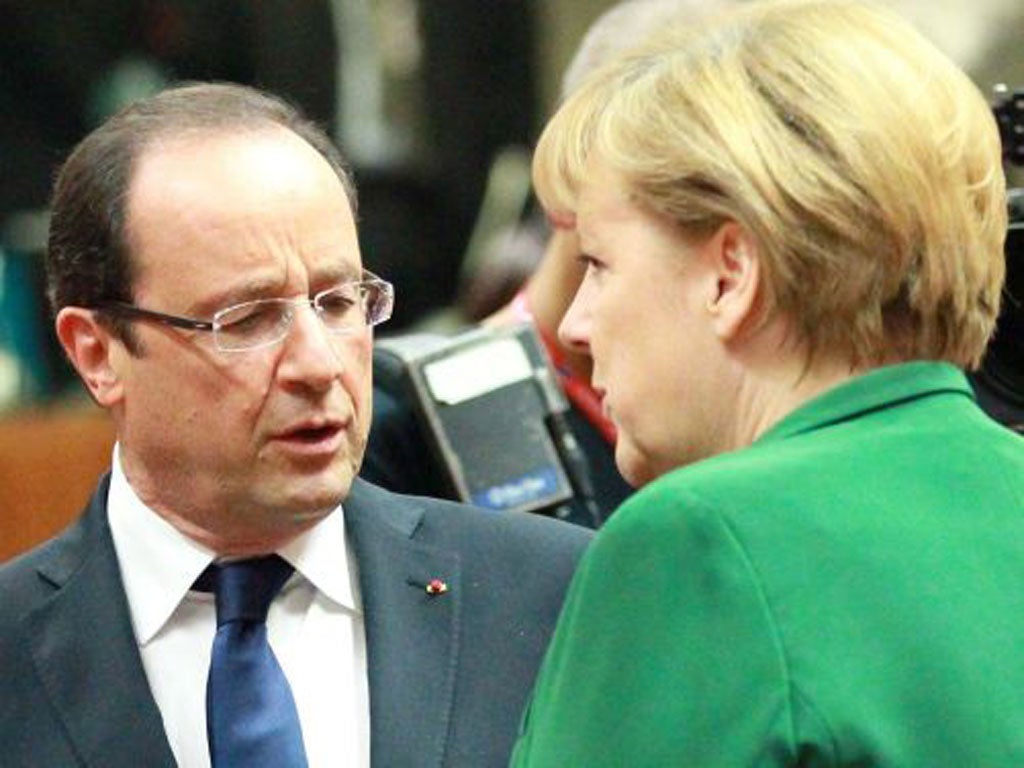Your support helps us to tell the story
From reproductive rights to climate change to Big Tech, The Independent is on the ground when the story is developing. Whether it's investigating the financials of Elon Musk's pro-Trump PAC or producing our latest documentary, 'The A Word', which shines a light on the American women fighting for reproductive rights, we know how important it is to parse out the facts from the messaging.
At such a critical moment in US history, we need reporters on the ground. Your donation allows us to keep sending journalists to speak to both sides of the story.
The Independent is trusted by Americans across the entire political spectrum. And unlike many other quality news outlets, we choose not to lock Americans out of our reporting and analysis with paywalls. We believe quality journalism should be available to everyone, paid for by those who can afford it.
Your support makes all the difference.France and Germany have agreed a new plan for closer eurozone political union despite David Cameron’s plan to renegotiate EU treaties on welfare and immigration.
The new Franco-German agreement would see closer cooperation between the 19 countries without any change to existing EU treaties, according to a leak to France's Le Monde newspaper.
The agreement would see cooperation in four areas “developed in the framework of the current treaties in the years ahead”.
The British government has previously accepted the need for tighter eurozone integration but has hoped that the rewriting of EU treaties to make way for it could allow Britain to make other demands about welfare and immigration.
In order for treaty change to take place every country in Europe must ratify new treaties, giving individual countries significant leverage in negotiations once they are opened.
The Franco-German plan would not see treaties reopened for negotiation, however, making this strategy unviable.
France’s Europe Minister Harlem Désir this month totally ruled out any treaty change for Britain’s demands and said any attempt was “doomed to failure”.
Taken alongside Mr Cameron’s plan, the eurozone proposals could see Europe move deeper into a ‘two-speed’ model with eurozone countries becoming increasingly integrated and non-members playing an increasingly peripheral role.
However, the fact the changes were agreed without recourse to rewriting EU treaties may also give hope that the British government could achieve EU reforms of a similar scale without treaty change.
This approach was dismissed by the government earlier this month and would represent a significant climb-down for David Cameron.
“He wants treaty change. All the advice that he has had is that treaty change is required, for example in terms of some of the changes that we want to see in welfare,” the prime minister’s official spokesperson told journalists at the time.
Mr Cameron last night met European Commission president Jean-Claude Juncker and told him that “British people are not happy with the status quo”.
David Cameron has promised to hold a referendum on Britain’s membership of the EU before the end of 2017. He has said he will renegotiate certain EU agreements regarding welfare benefits and migration from other European countries.

Join our commenting forum
Join thought-provoking conversations, follow other Independent readers and see their replies
0Comments